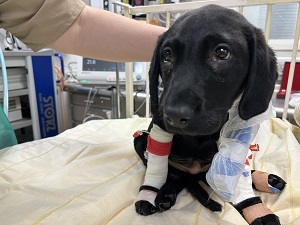A Decade of Extracorporeal Therapy
Clinical Connections – Summer 2023
Rosanne Jepson and Stefano Cortellini, Co-Directors of the Renal Replacement Therapy Service
It is ten years since we began delivering extracorporeal therapies for cats and dogs with kidney injury, immune-mediated disease and certain toxicities. More than 50 patients have received the advanced treatments, most of which would have died without it.
RVC Small Animal Referrals is the only veterinary centre in the UK to have extracorporeal therapy. The equipment was funded by the RVC’s registered charity, the Animal Care Trust.
The machine uses different filters, which allow removal of different sizes and types of molecules. These molecules could be undesirable substances, such as toxins or drugs, excessive water or toxins that accumulate in acute kidney failure, or specific antibodies which can cause various auto-immune diseases.
The treatment is called renal replacement therapy (a form of dialysis) when we treat patients with acute kidney failure, and plasmapheresis or therapeutic plasma exchange (TPE) when we treat patients with immune-mediated disease. Both dialysis and plasmapheresis can be used for the removal of toxins and drugs.
'Alabama rot' and Alba
In 2014 the team and equipment enabled a breakthrough in the treatment of cutaneous renal glomerular vasculopathy (CRGV), dubbed 'Alabama rot' and ‘New Forest syndrome’. A Labrador puppy called Alba started developing wounds over her body and acute kidney injury. She was referred to the RVC Emergency and Critical Care clinicians, who became concerned she was suffering from CRGV.
There were no documented cases of dogs with this condition and severe renal failure surviving and dozens of dogs had died, despite expert veterinary care. Alba’s condition continued to worsen during hospitalisation and her urine production started to decrease – a sign that the kidneys were shutting down.
Plasmapheresis had never been attempted as a treatment for a dog with CRGV, but her owners were keen that all treatments were considered. Using the evidence-base from human medicine, where similar conditions can be helped by TPE, Alba was treated with this novel therapy.
She made a good recovery and went on to become an active adult dog. She returned to the RVC in 2016 for an event marking the 30th birthday of the Queen Mother Hospital for Animals.
The RVC is one of the few centres in the UK researching into trying to identify the cause or a cure for CRGV, as these are currently unknown.

Jonah’s case
Several animals that had swallowed specific toxins (such as raisins) or either eaten or received inadvertent overdoses of drugs have been successfully treated in the same way at the RVC. One such case was Jonah, a one-year-old cocker spaniel, who was referred in 2020 following suspected phenobarbitone intoxication.
On arrival Jonah was comatose, had breathing difficulties and required immediate intubation. Mechanical ventilation was started, and dialysis performed to remove the excessive phenobarbitone. Jonah responded well to dialysis, recovering from his coma within three hours of starting treatment.
Without this treatment, his body would have taken several days to remove this drug. Jonah continued to improve, became progressively more alert and was soon ambulatory. He was discharged fully recovered two days later.

Marty’s case
A more recent patient was 10-week-old Labrador Marty, who was referred earlier this year. He presented with a bacterial infection (leptospirosis) causing both acute kidney failure and liver damage.
Despite starting antibiotic treatment and supportive therapy, including diuretics to try to improve Marty’s urinary production, his kidneys completely stopped producing urine (anuria) and we were concerned he would develop life-threatening complications.
Dialysis was discussed with Marty’s owners and three dialysis sessions were performed over the following days. During those sessions Marty required two packed red blood cell transfusions for development of anaemia.
Marty started producing urine after the final session, which was a fabulous outcome for the team looking after him. His kidney values gradually returned to normal over several days and, by the time of discharge, he had returned to his usual excitable temperament.
Extracorporeal therapy has become an integral part of the management of critical dogs and cats at the RVC, either in treating severe cases of acute kidney injury, immune-mediated diseases or in treating drug overdoses or toxin ingestion.
